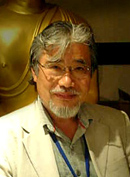Home > Overview of Program : Message from the Program Coordinator
Global Human Resource Development for Nuclear Safety,
Security and Safeguards
- Message -
 Program Coordinator Masaki Saito |
Energy demand is exploding in emerging countries today even as global petroleum resources run dry. Facing the urgent problem of securing a long-term, stable energy supply, many countries are turning to the development of nuclear and natural energy solutions. Japan is moving along the path of research, development and use of nuclear energy, and has developed nuclear technologies that have earned worldwide respect.
In recent years the following key issues have emerged.
- On September 11, 2001, a large-scale terrorist attack occurred on United States soil. Nuclear power plants are also a target for international terrorists.
- At the G8 Hokkaido Toyako Summit held in July, 2008, participants discussed the importance of safety, security (anti-terrorism measures) and safeguards (protective measures and prevention of nuclear proliferation). Japan, in particular, announced a “safety, security and safeguards initiative.”
- When a Nuclear Security Summit was convened in Washington in April, 2010, Japan announced the establishment of a support center to strengthen global nuclear security.
- The Great East Japan Earthquake, which struck on March 11, 2011, caused a severe accident (large-scale nuclear hazard) to occur at the Fukushima Daiichi Nuclear Power Plant.
In view of this state of affairs, a global need exists for nuclear power at an appropriate scale to support sustainable development. Japan’s mission is to resolve the Fukushima nuclear accident at the earliest possible date, gather lessons learned from the accident, and contribute to the introduction of the most stringent standards of safe operation in the world’s nuclear-power plants. Currently, however, the number of personnel who can be in charge of such a mission is insufficient. Backed by its world-renowned resources in nuclear-power education, the Tokyo Institute of Technology’s vital mission is to develop personnel who can serve as international leaders in nuclear power in Japan and around the world, whether in industry, government or in academia.
One of the issues to be resolved through this academic program is that of nuclear safety, security and safeguards: the prevention or correct handling of a global nuclear crisis, such as threats to lifelines from nuclear proliferation, nuclear terrorism, large-scale nuclear accidents and radiation-exposure emergencies. We believe that a lasting solution to these problems would contribute significantly to the formation of a society capable of protecting peace, safety and security.
Our educational goal is to develop global human resources for nuclear safety, security and safeguards: personnel who can serve as international leaders in industry, government and academia with respect to nuclear power in Japan and abroad.
We expect that students selected for the Tokyo Institute of Technology Program for Leading Graduate Schools will enter the Institute’s newly established boarding-instruction system, the Global Nuclear Safety, Security and Safeguards Workshop. There they share accommodations and meals with other students, workig hard and learning from others. Assistant instructors will live with the students; these instructors are expected to engage the students in wide-ranging debate, to strengthen students’ awareness of their future roles as global leaders.
The key features of the program are as follows.
- New-entrant-class system with rotation among laboratories :
This system has already been introduced for new entrants in the masters program from October 2008. For the first six months after entry into the masters program, students are not assigned to a laboratory but are placed in a new entrants’ class. There the students are tasked with basic coursework subjects and required to attend three laboratories, to study a diverse range of world-leading laboratories. - Entry into the Global Nuclear Safety, Security and Safeguards Workshop :
About six months after entry, students selected for this program enter the boarding-instruction workshop. Students are expected to share accommodations and meals with other students, workig hard and learning from others. - Second selection process :
About six months after entry, about 15 of the approximately 30 new entrants to the masters program are selected in the first round to enter the Global Nuclear Safety, Security and Safeguards Workshop. After completion of the masters program, about six of the masters-program graduates are selected to join this program as outstanding doctoral students.
Tokyo Institute of Technology has been training nuclear engineers for over a half century, since the establishment of the program in nuclear engineering in 1957. The Institute continues to serve today as one of the world’s top educational resources in the nuclear-energy field. Our teaching staff is united in its educational goal of developing global human resources for nuclear safety, security and safeguards: personnel with excellent international negotiating skills who can serve as international leaders in industry, government and academia with respect to nuclear power in Japan and abroad.
December 7, 2011
